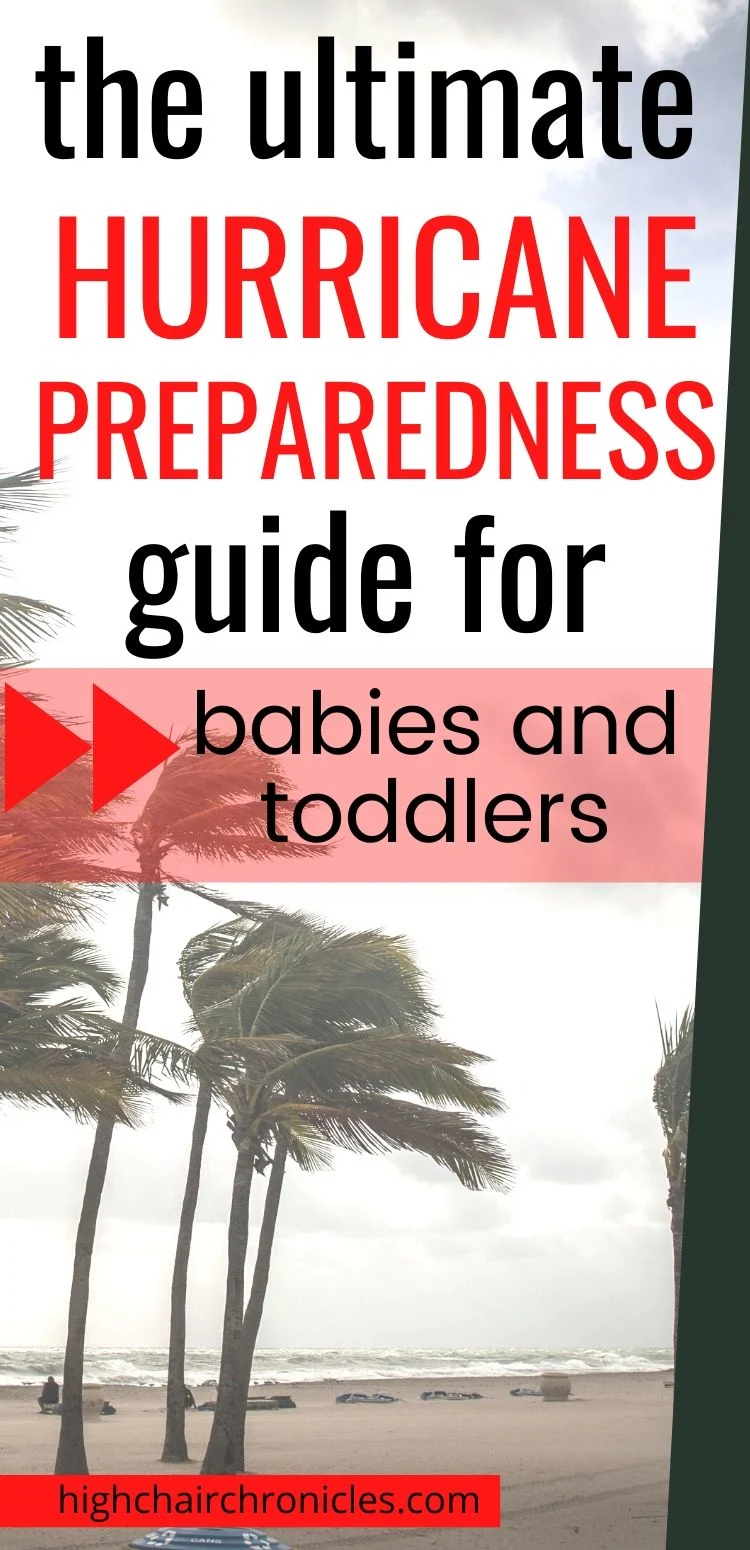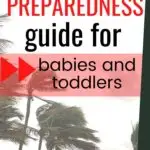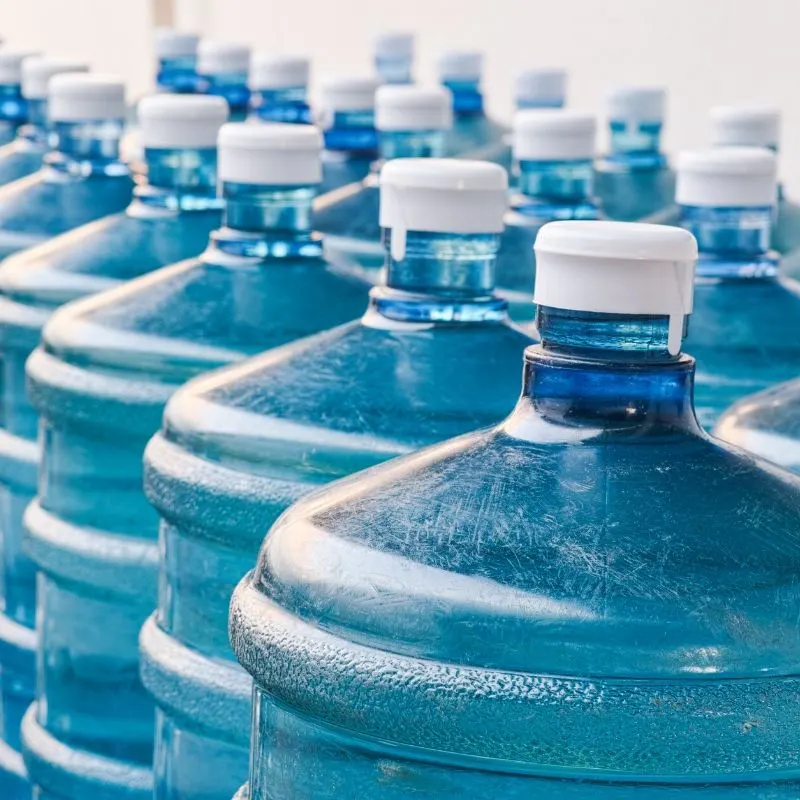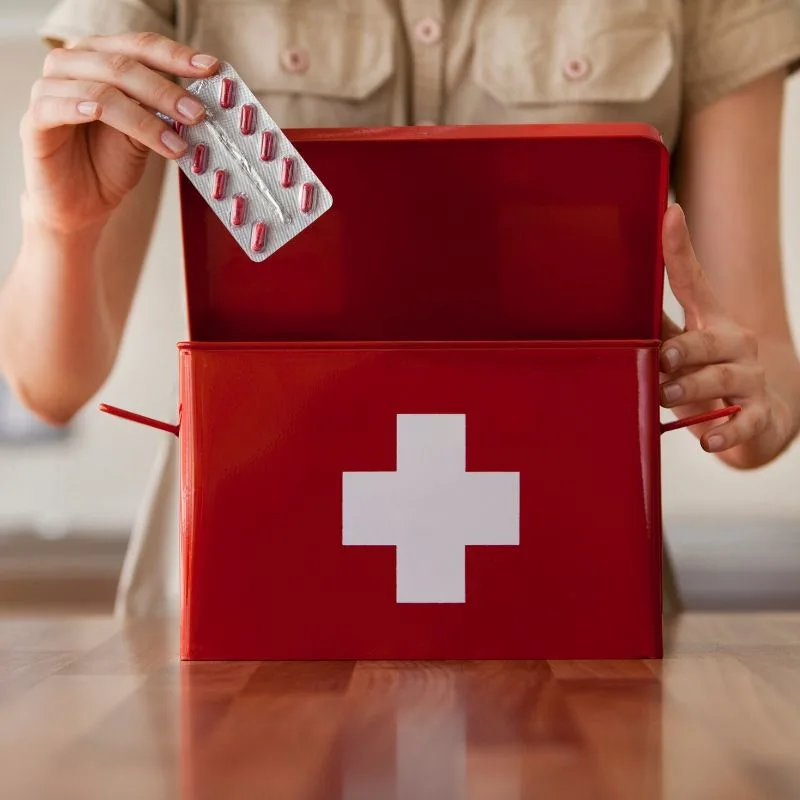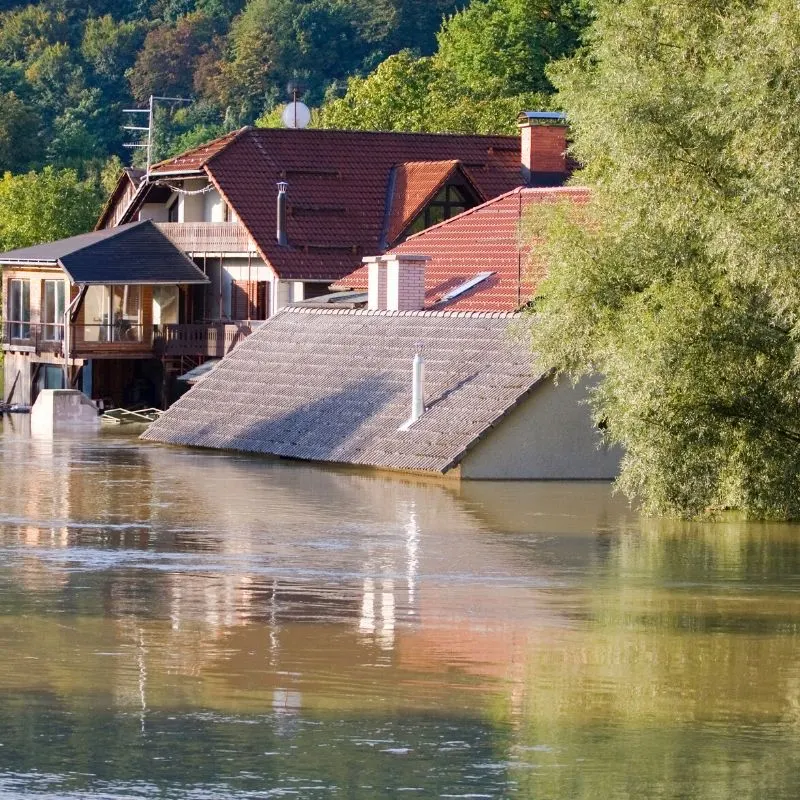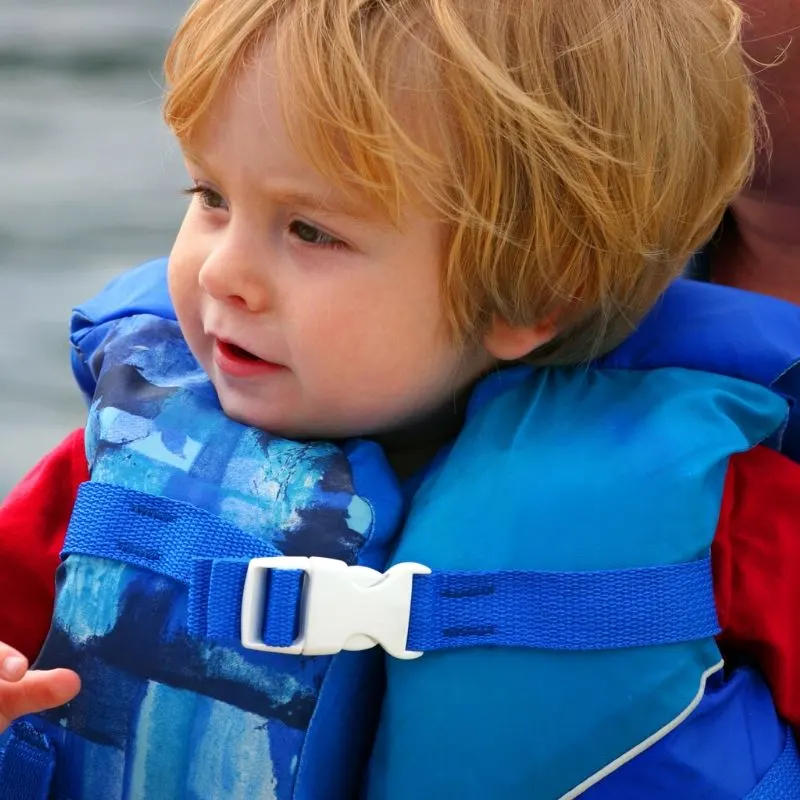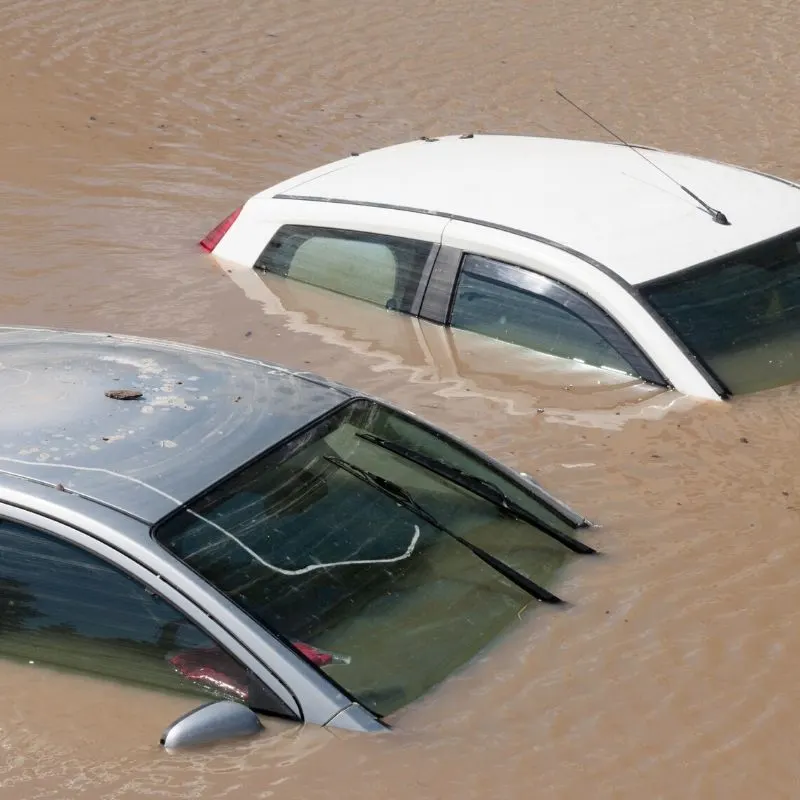We lived through hurricane Dorian in 2019 while living on Grand Bahama Island, so I wanted to share what we did to prepare for the hurricane with our toddler, and lots of really specific practical tips for surviving a hurricane with a baby or toddler that you won't find elsewhere.

This is SO MUCH MORE than just an article telling you to get flashlights, bread, and milk. Reading through this before there is a hurricane coming your way will help you think through what you really need and feel more mentally prepared to tackle the work when it's time to prep.
In addition to baby-specific tips for hurricane preparedness, this hurricane preparedness guide talks about what to do if you lose power, running water (or if your tap water is contaminated), or have flooding during a hurricane.
Things like feeding and bathing your child become infinitely more difficult when you have no running water, power, or gas. Things like this can happen even in a tropical storm that just happens to damage critical infrastructure.
I recommend reading the whole post in order to be really prepared for any situation, but feel free to use the Table of Contents below to skip ahead to the sections that are most relevant to you now:
Table of contents:
- Preparing food and drinking water - with special considerations for babies and toddlers
- Preparing for not having running water or drinkable water for weeks - with special considerations for babies and toddlers
- Preparing medicine and first aid kits
- Where to sleep during a hurricane
- Surviving flooding
- Emergency evacuation prep
- Distributing the risk
- Other hurricane preparedness items
A few important things before I get into the hurricane preparedness guide:
- This is NOT a comprehensive list of things to do while preparing for a hurricane. Please check the CDC website as well as your local government website in addition to reading this hurricane prep list to make sure you're prepared.
- Check with your pediatrician to see if they have any other specific recommendations for your baby or toddler. Think about your specific situation - are you pregnant? Do you have a special needs child or family member?
- A lot of the tips here are truly survival mode tips for extreme situations, such as water flooding up to your roof, no running water or electricity for weeks, etc... Let's hope it never comes to that. But it's better to be prepared because it HAS happened. Look at Dorian in the Bahamas. Look at Katrina, in NOLA. Look at Sandy in NJ. It's better to be safe than sorry.
This post contains affiliate links. As an Amazon associate, I earn from qualifying purchases. See my disclosure.
Hurricane preparedness - food and drinking water
- Have enough shelf-stable food and drinking water for the whole family about 3 weeks. Think of meals you can make or eat that don't require cooking or refrigeration, or can be cooked super fast on a propane stove / burner (make sure you get the propane cylinders!). Foods like ramen or rice noodles that require only boiling water are ideal. Let's hope that grocery stores and restaurants open up quickly and emergency supplies arrive, but let's plan as if they don't. Even if stores and restaurants reopen, they often have hour long lines after a natural disaster. It's better to be prepared at home.
- Reserve several extra gallons of drinking water for brushing your teeth and rinsing your face in case water supply is contaminated or water is shut down. We got three 5-gallon water containers, this water jug stand and dispenser (make sure it's compatible with the thread on your water containers! And remember not to get an electrical-powered one because you might lose electricity), and several extra gallons and 2-liter bottles of water.
- Have several containers of shelf-stable milk or powdered milk. If your baby is the only one who drinks milk then you might want to get small 8-oz cartons such as these. If your whole family would have milk and cereal, then opening a larger 1-quart container and finishing it in one meal is a great way to have breakfast without requiring refrigeration.
- Get snacks that your baby or toddler likes. It's OK if they're not the healthiest snacks. Calories are what matters when you can't cook meals. We had lots of goldfish crackers, puffs, mini pretzels, mini cookies, and fruit snacks.
- Make sure you have baby formula and baby food. Packaged baby food is pretty great for toddlers too, when you can't cook a meal for them.
- If you have a toddler, get some juice boxes and single-serving milk cartons, even if you don't give your child juice or milk. They'll need to stay hydrated during and after the hurricane, especially if power is out and it is still hot outside.
- If you are still pumping, make sure you have batteries for your breast pump, extra pump parts (since it will be hard to wash and sanitize pump parts), and practice expressing milk by hand or with a manual pump just in case.
- Fridge and freezer thermometers to check the temperature of the fridge and freezer in case you lose power (you'll need two!). You might be able to eat that refrigerated and frozen food for several days if you plan ahead smartly - it helps to know when the temperature has reached an unacceptable level!
Hurricane preparedness - no running water or contaminated tap water
In addition to drinking water, you'll need water for showering / washing up, rinsing dishes, etc. Here's what we did to prepare for not having water for weeks and how we handled bathing without running water, giving our toddler a bath without running water, and washing baby bottles without running water.
- Fill up the bathtub with water. Do this a few days in advance and TEST it beforehand to make sure it doesn't slowly start draining. To do this test, make a tiny mark on the tub with permanent marker and make sure the water level doesn't decrease after 24 hours. If you don't have a tub, fill several large storage bins with water.
- Here's a flyer from the CDC about how much bleach to add to water to keep it from growing mold and bacteria. Use this water to flush the toilet (use a small cleaning pail or bucket) and to clean things like floors or walls, if you need to. Don't use this water for drinking, washing dishes, or bathing.
- Have a cup of water by the sink to brush your teeth and rinse your face.
- Get a small plastic bottle and carefully drill a few small holes in the cap. Refill this water bottle with fresh drinking water and use it to rinse your hands, face, clean dishes, etc. Pouring water from a cap with small holes saves a LOT of water compared to pouring water straight out of a water bottle. We were able to make our water last a long time using this method.
- Get another small plastic bottle and carefully drill a few small holes in that cap as well. Fill this bottle with very lightly soapy water. Use this soapy water to wash your hands. Then rinse your hands with clean water from a bottle with holes in the cap.
- Washing baby bottles and baby feeding utensils: Plan on using about a half gallon of water per day to clean baby bottles and baby feeding utensils, maybe more. Fill a large kitchen bowl halfway with water and add a drop of dish washing soap. Place the used bottles and feeding utensils in the soapy water and rinse well. Rinse the utensils with clean water using the plastic bottle with the holes in the cap. To wash the baby bottles, fill the bottles with about an ounce of clean water, tightly cap, and shake. Spill out the soapy water and refill with clean water again, cap, and shake. Repeat until the water inside the bottle is not bubbly, then rinse the outside of the bottle with water. Yes, it takes a while but this method uses the least water.
- Showering: Get a large 2-liter plastic bottle or 1-gallon bottle and pierce holes in the cap as well. Use this water to rinse off. You might not be able to get a proper shower, but at least you'll feel cleaner.
- Bathing a baby or toddler: Use the same technique as #7 above to rinse your baby or toddler with room temperature clean water. You can use mild baby soap diluted in water in a separate water bottle, just make sure you rinse off the soap well! We gave our toddler a bath in a large storage bin because our kitchen sink was not super clean after a few days of rinsing dishes/bottles in it and not having running water to clean the sink. Give your baby baths daily to make sure they don't get any heat rashes or other rashes because things around the house tend to get really dirty after not having running water for several days, especially if you have any flooding in the house.
- Baby wipes for "showering." Use baby wipes on your underarms and private areas to wipe yourself daily to stay clean-ish. So stock up on more baby wipes than your baby typically needs for a few weeks, because you'll be using them too!
- No laundry. Don't forget that if you don't have running water, you can't really do laundry. Have enough shirts, pants, and underwear for yourself and your kids, if they're potty trained. We bought 20 extra pairs of underwear for our son because he was potty training and went through several per day.
Hurricane preparedness - medicines and medical supplies
Make sure you have keep all medicines in a large zip-lock bag that you can find easily (unless they need to be refrigerated, in which case keep the medicines in a small cooler with ice). Some of the things we made sure we had were:
- Prescription medicine (enough supply for 7-14 days, depending on how critical it is)
- Baby tylenol, or whatever fever-reducing and pain-reducing medicine you use for your baby
- Eczema cream or baby lotion, just in case
- Diaper cream (even if you don't typically need it - things get sticky and rashy after hurricanes)
- Advil or tylenol for headache relief for adults
- Allergy medicine (zyrtec, benadryl, epi-pen - whatever you might need)
- Probiotics, if your baby or toddler ever has tummy issues or typically eats yogurt
- Anti-itch cream (or hydrocortisone)
- Anti-diarrhea medicine
- Baby thermometer
Also have mosquito repellent in a place where you can reach it.
Where to sleep during a hurricane
- Plan to sleep in the same room with your whole family, if the hurricane might hit at night. You don't want to be separated from your baby in case a tree falls on the house or anything else happens where it might be hard to get to your baby. We moved our crib to the living room and put an inflatable mattress on the floor. Make sure you inflate the mattress before power goes out! The bathroom (away from the windows) is often recommended as one of the safest places to sleep - but that is not a good idea if you have a tub filled with water and a toddler, or a small bathroom.
- If the power goes out and you live in a hot climate, it might be HOT. Get a couple of battery operated fans and extra batteries, and keep your baby or toddler cool at night, since babies can't regulate their temperatures that well. We were not prepared with a fan when Dorian hit. I remember staying up at night just to fan my son off with a piece of paper and to wipe sweat off his little body while he slept. This is the fan we got for this hurricane season and it's great for providing relief from the heat. It uses D Batteries.
- If the power is out for a few days and it is hot where you live, you might need to open the windows to help stay cool. We had a pack and play with a mosquito net for our two year old to sleep in because those mosquitos got inside the apartment!
Hurricane preparedness - survival with flooding
Let's hope things don't come to this. But if you live near the ocean, you might get flooding inside your house. And it might not be slowly rising water where you stand in ankle-deep water and have a few minutes to think about the next steps. It might be powerful waves crashing into your house, breaking the door down, ripping kitchen cabinets off the walls, then sucking all the contents of house out with their force. Think about going into the ocean when there are strong waves. Then picture those waves inside your house.
Make sure you have the following somewhere in a place where you'll be able to grab them quickly:
- Rope
- Life vests for everyone, including baby
- Hatchet or heavy mallet in case you need to break the walls down, the ceiling, or the roof to escape the house
- Small ladder / step stool
- Baby carrier, so you can put your baby on your chest or back if you need both hands free to climb anything
I know someone who had to put a life vest on her 3 year old and tie him to her with a rope so that she wouldn't lose him under water as the water was destroying her house and sucking him under. It's horrifying to think about.
During hurricane Dorian, a lot of people went into the attic of their houses to escape the rising water. They ended up trapped in the attic of their house and drowned as the water levels kept rising above the roof. If you do need to get into the attic because of rising water levels, PLEASE bring something like a hatchet, demolition mallet, and a ladder with you into the attic just in case the water keeps rising. Look at what your roof is made of and see what you will need to break through it.
If you end up having to escape from your attic onto your roof, at least there is a chance or rescue teams finding you, instead of being trapped above the ceiling as water levels rise.
A few additional tips for preparing for flooding during a hurricane:
- Have copies of all your important documents in a heavy, water-proof box or safe: passports, driver's license, birth certificates, social security cards, house deed, car title, etc.
- You can pack valuables like laptops, iPads, etc in a large plastic bin with a lid and put everything on the kitchen counter, in case you have a little flooding in your house or a roof starts leaking and dripping water.
- If you notice water dripping from the ceiling anywhere, place a large storage bin underneath, put on safety glasses and carefully drill a hole or poke a hole through the ceiling sheet rock to let the water out. Otherwise the water might build up and collapse the ceiling if it doesn't drip out fast enough. Better to fix a small hole in the ceiling and dump the water from the storage bin than to have a collapsed ceiling!
- Have lots of extra towels ready. We didn't have flooding but the apartment above us did, which led to water dripping from the ceiling and water seeping in through the sheet rock walls. We used towels to soak up the water and squeeze that water out into a large storage bin. For hours. It was exhausting, we had so many calluses and raw spots on our hands, but the other option would have been slippery tile floors and an active toddler. By the way, large towels are actually not ideas for soaking up the water because they are SO HARD TO WRING OUT. The towels that were the most useful to us were these microfiber towels. They are super absorbent and wring out easily.
Hurricane preparedness - emergency evacuation bag
In addition to preparing your house for a hurricane, prepare an evacuation bag for everyone in the family with 1-2 days worth of clothes, diapers, baby wipes, baby food, crackers, flashlight, a week's worth of medicine, and your original documents (passport, license, social security cards, etc.).
Have this bag ready in case the state suddenly orders everyone to evacuate before the storm - you want to be able to get ahead of the traffic.
If you have to evacuate mid-storm, a backpack is probably easiest to grab and go, especially if you'll be holding a baby or toddler. Keep those bags on the kitchen counter or by the door so you can grab them quickly.
Hurricane preparedness - distributing the risk
Here is one additional important piece of advice you might want to consider, since you don't know which areas of your town will flood or lose power and water and which won't:
- Before the hurricane, pack a suitcase of essential stuff for the whole family and bring it to a family or friend's house who lives in a different town or neighborhood, or lives more uphill from you. This way in case your house is not livable for several days or weeks as things get repaired or as flooding goes down, you'll at least have your clothes, your toddler's favorite book or toy, your medicine, a phone charger, etc.
- If you have two cars, move one to a different area. You never know which areas will flood, which will have a tree fall on the car, etc. We live right at water level and moved one of our cars to a friend's house who lived on a small hill. The car that we kept at home actually ended up not working after the hurricane, so we were glad we had one car in working condition!
Other hurricane preparedness items
Here is a list of other things to have on hand in case of a hurricane and other tips. Most of these are obvious and listed in other sources of information, but it never hurts to be extra safe so I am listing them here.
-
- Battery pack for charging your phone (keep it charged, and keep your phones plugged in as the storm approaches in case power goes out!). Look for one with the highest mAh number for the money. This is the one we have and we love it because it can charge 2 phones at once and has a flashlight feature (which we never used but it feels important when you're panicking and preparing for hurricanes! lol). We use it all the time even outside of hurricane season.
- First aid kit
- Flashlights with extra batteries
- Headlamps with extra batteries
- Lantern with extra batteries
- Matches (make sure they are dry and they work! Store in a zip lock bag)
- Candles
- Extra towels
- Battery powered radio, or a hand-cranked radio
- Battery powered fan
- Propane stove / burner, in case gas or power are out and you can't cook - make sure you get the propane cylinders too!
- Board up your windows if you don't have hurricane-proof windows or doors
- Put sandbags in front of your door to prevent extra water from going in
- Make sure to have your neighbors contact information - stored on your phone and on paper. Check on each other during and after. Text each other if you get water in your house or if you need to get evacuated in the middle of the storm. You'll be each others' most helpful resources for recovery after the storm and knowing where to get help if needed.
- Emergency contact information - stored on your phone and on paper.
This is a lot to take in. I know.
Sadly, living in a hurricane-prone area means we have to disrupt our lives completely for about a week or so to prepare for a hurricane. Planning in advance and knowing that you're prepared can definitely help relieve some of the stress, so please read through this (if you skimmed it) and share this with someone who might need to start preparing early.
Know someone who needs to read this list to be prepared for storms and hurricanes? Please share it with them. And don't forget to save it for later on Pinterest so you can refer to it when you need it:
